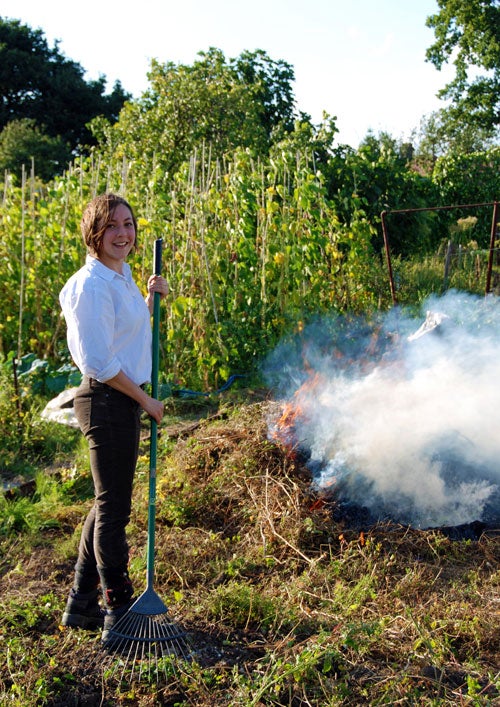The youth trend that's not for couch potatoes
See the world and learn how to grow organic produce at the same time. Rachel Shields reports on the rise of the global wwoofer

Your support helps us to tell the story
From reproductive rights to climate change to Big Tech, The Independent is on the ground when the story is developing. Whether it's investigating the financials of Elon Musk's pro-Trump PAC or producing our latest documentary, 'The A Word', which shines a light on the American women fighting for reproductive rights, we know how important it is to parse out the facts from the messaging.
At such a critical moment in US history, we need reporters on the ground. Your donation allows us to keep sending journalists to speak to both sides of the story.
The Independent is trusted by Americans across the entire political spectrum. And unlike many other quality news outlets, we choose not to lock Americans out of our reporting and analysis with paywalls. We believe quality journalism should be available to everyone, paid for by those who can afford it.
Your support makes all the difference.It is a taste of the good life for the iPhone generation: more rewarding than InterRailing, safer than kibbutzim. It even has a catchy name, wwoofing. Record numbers of environmentally conscious young people are volunteering through the organisation Worldwide Opportunities on Organic Farms (Wwoof).
In the UK alone, volunteer numbers have doubled in the past three years; providing a stream of free labour that is proving a godsend for some of Britain's struggling organic farmers. At the moment 400 of the UK's 5,000 organic farms participate in the scheme – under which more than 3,000 volunteers work for up to 30 hours a week, weeding, planting and fruit picking in exchange for board and lodging. But the organisation says more farms are needed. "We've had a surge in people wanting placements, and quite a few branches around the world have been swamped and have stopped taking on new members," said Katherine Hallewell, a spokeswoman for Wwoof UK.
"We have the young gap-year types," she added. "And those who use it as a life-changing step. It is a fantastic way to learn about growing, and a good way to learn an alternative lifestyle."
Bethany Wells, 25, an MA student from London, chose wwoofing as a way of seeing Scandinavia on the cheap, but said it has left more of a lasting legacy than most holidays. "It expanded the time I could travel for. I worked on the farm for more than two weeks, and it was good to get out of the centre of places and into the middle of nowhere," she said. "It is a great way of meeting people and I'm still in touch with one of the friends I made there. I got completely eaten by mosquitoes but the food was good, the company was good, and there was a lake and a wood-fired sauna we'd spend our evenings in."
The organisation, established in 1971, has branches in 88 countries and has seen rapid global growth; the number of volunteers in the US increased from 1,600 in 2005 to 9,000 in 2010.
"It has had an impact on the rest of my life: since I got back, I've been really into gardening. It really inspired me," said Miss Wells. "There are lots of people whose lives are based in the cities but who want to feel connected to the country, this lets you do that without leaving the city entirely."
The trend also bears testimony to people's faith in the hard-hit organic sector, which saw sales fall by 12.9 per cent in 2009 as consumers become more price-conscious during the recession. There was also a damaging Food Standards Agency report that found organic food offered no extra health benefits. And, just last week, researchers at the University of Leeds questioned the idea that organic farms are better for wildlife, finding that birds such as skylarks and lapwings are actually less likely to be found in organic fields.
Wine from England's oldest organic vineyard, Sedlescombe Organic Vineyard in Sussex, is produced with the help of 30 to 40 wwoofers a year. "This place wouldn't be here today if it wasn't for wwoofing," said Roy Cook, 64, the vineyard's owner. "We've been hosting wwoofers since we started full-time in the 1980s. Lots of organic farms wouldn't have got off the ground without wwoofing."
However, some express fears that struggling farms may exploit volunteers, who pay a £20 membership fee, by over-working them in the absence of paid staff. The organisation does not vet volunteers or farmers, but relies on "trust", and feedback.
Others point out that wwoofers receive free tuition in organic farming. Host farms do not need to be certified as organic, but they must sign a declaration stating that they farm using "ecologically sound methods".
The Soil Association, which promotes organic food, has a lengthy waiting list for its two-year paid organic-farming apprenticeships. "We really struggle with getting enough farms on board," said the Soil Association's Amanda Daniel. "You have to be able to pay a wage, which is difficult for hard-up farmers, and to take the time to train them. Government sponsorship would be very helpful."
Join our commenting forum
Join thought-provoking conversations, follow other Independent readers and see their replies
Comments